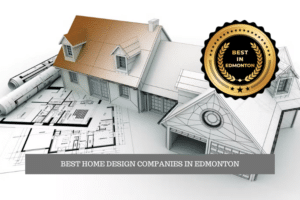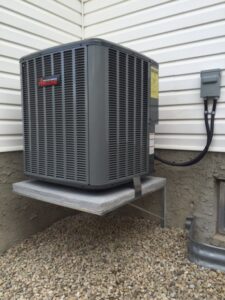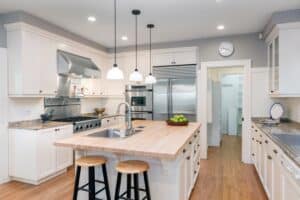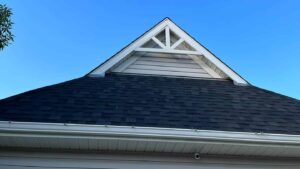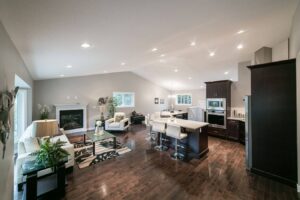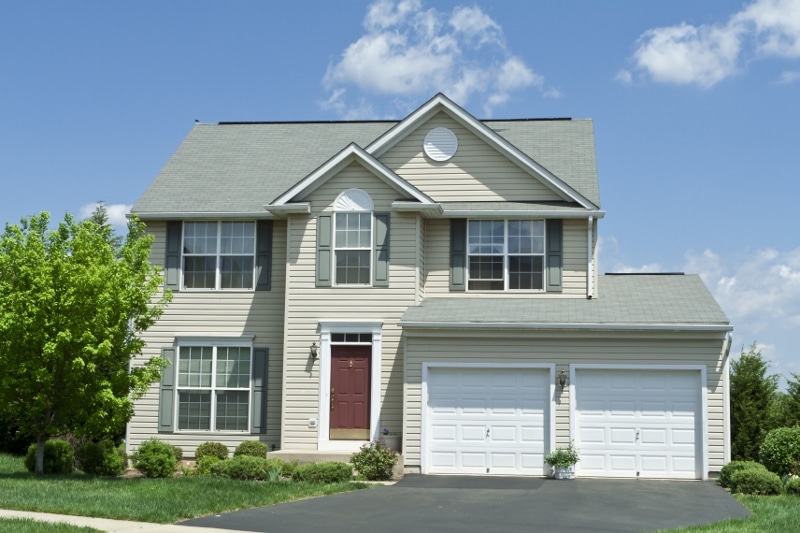
Your home’s siding is its first layer of defense against the elements. Siding needs to be durable, weather-resistant, energy-efficient and attractive. Whether you’re updating your home’s exterior or investing in a new home build, choosing the right siding for your home can help protect it and protect your home’s value too.
A siding replacement has a good return on investment. This report shows that a mid-range siding replacement can recover over 75% of its cost at resale. How much monetary value will that add to your home? If you spend $16,000 on a siding replacement, you can expect your property value to increase by more than $12,000. Plus, your home will be more attractive to buyers, which can give it a competitive advantage on the market.
There are several types of siding available. Each have their pros and cons, visual appearance, cost, and some are better suited to certain climates. The top 5 most popular siding options for homes include vinyl, wood, fiber cement, metal, engineered wood, and stucco cladding. In this article, you will learn the advantages and disadvantages of each along with some siding cost estimates.

Table of Contents
Toggle1. Vinyl Siding
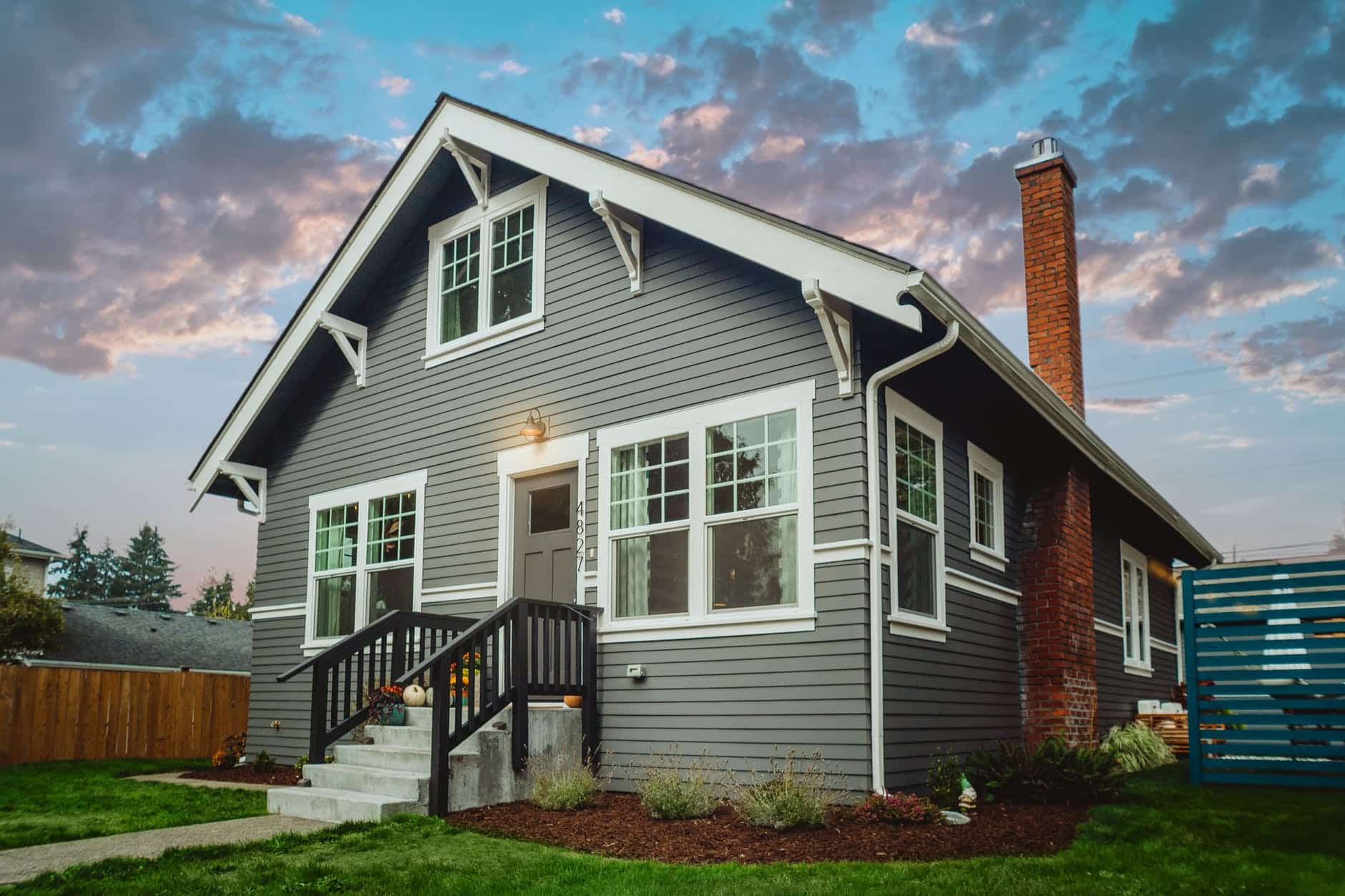
PROS:
Vinyl siding is one of the most popular siding options for residential homes. It is durable, and low maintenance as it never needs to be painted. You can choose from a wide range of colours and styles, with some vinyl siding made to mimic the look of real wood siding. Thanks to the latest manufacturing processes, vinyl siding is resistant to colour fading. It’s also relatively easier to install, which helps make it less expensive than other siding materials.
CONS:
Vinyl siding can be damaged in high winds, so if your home is subject to blasting wind, it might not be the best option. Also, siding is not 100% waterproof. While it will keep out most weather, you cannot wash your vinyl siding with a hose or pressure washer. If you blast between the vinyl planks, you could get water between the siding and the house, causing damage, rot and even mold. Also, vinyl can crack in extremely high temperatures.
COST:
There is a price range for vinyl siding, depending on the quality of the product installed and the size and complexity of the installation. The cost per square foot for vinyl siding is $2.00 to $7.00. The estimated total of installing vinyl siding is between $5,655 and $13,890.
2. Wood Siding
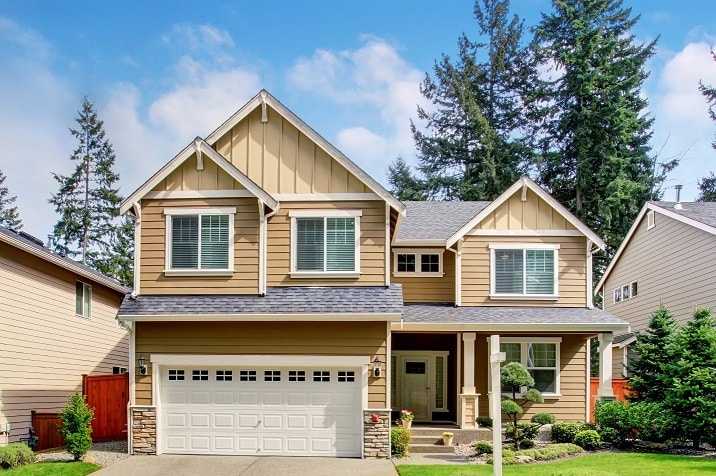
PROS:
Wood siding, also known as bevel or clapboard wood siding, is a traditional cladding option. Homeowners can choose from a range of wood species including cedar, fir, pine, spruce, and others. Wood is an eco-friendly siding option as it is a natural resource and 100% recyclable. Wood is a natural insulator, so it will assist in improving your home’s thermal performance.
Some wood types, like cedar and redwood, are naturally resistant to insects and rot. Wood is an attractive choice and with an endless selection of stains and paints, it can be totally customizable. It is durable, and if a plank is damaged, it can easily be replaced by an avid DIYer.
CONS:
Wood requires a level of maintenance to keep it in good shape. Wood is a natural product, therefore, it’s naturally susceptible to rot, cracking, insect damage and warping. To keep that from happening, make sure you treat your wood siding with paint or stain every few years. If you live in a humid or wet climate, choose a wood siding that is resistant to rot like cedar. Wood siding is can also be more expensive than other siding options.
COST:
There is a price range for wood siding, depending on the type of wood installed and the size and complexity of the installation. The cost per square foot for wood siding is $3.25 to $15.75. The estimated total cost of installing wood siding is $7,000 to $23,000.
3. Fiber Cement
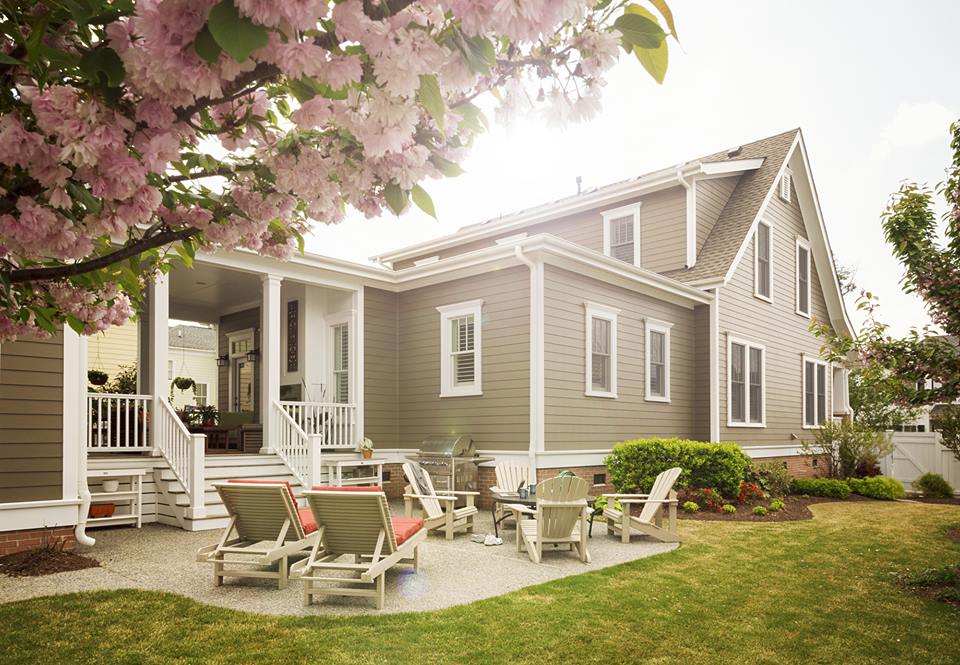
PROS:
There are a few fiber cement siding products available on the market, but the most popular tried-and-true brand is James Hardie Siding. Fiber cement is created by mixing sand and fibers from cardboard, held together with a durable resin. This siding option is virtually maintenance-free, which is why it’s so appealing to homeowners.
It’s resistant to rot, insect damage, fire and all kinds of weather. It is available in a wide range of colours and looks like real wood siding, without the high maintenance of wood siding. To keep it looking great, simply wash it down with a little soap and water and your garden hose.
CONS:
Fiber cement siding is expensive. This is largely because of its weight and how difficult it is to install. When you go with fiber cement, you will pay a heftier fee for installation and it will take longer to install than other siding options. Fiber cement siding is also not resistant to scratches, chips, and fading. After several years, it will need to be re-painted. It is also difficult to replace damaged planks.
COST:
There is a price range for fiber cement siding, depending on the quality and brand of the product installed and the size and complexity of the installation. The cost per square foot for fiber cement siding is $0.70 to $5.25. The estimated total cost of installing fiber cement siding is $5,540 to $17,530.
4. Metal Siding
PROS:
Aluminum siding used to be the go-to for metal siding, but steel siding has made an appearance in the residential siding market. Both options are a good choice if you live in an extremely cold climate as they offer good thermal protection from the cold. Metal siding is also waterproof, so it can be an ideal choice in wet or coastal climates too.
Aluminum siding is lightweight, making for an easier and more cost-effective installation. Both aluminum and steel siding can boost your home’s energy efficiency. Metal siding is also resistant to water, mildew, mold, fire, and insects. Aluminum is resistant to rust and when treated properly, steel can be too. Metal siding is also recyclable.
CONS:
Aluminum siding can start to look worn out over time. Some might consider this type of siding an old-fashioned option and find it less attractive than wood, vinyl or fiber cement siding. Metal siding can dent and scratch easily, and it is not easy to replace. It can also start to fade or take on a chalky colour. Once this happens, it will be nearly impossible to match any pieces that need replacing in the future. Unlike aluminum, steel siding is heavy and difficult to install, which will drive up installation costs.
COST:
There is a price range for metal siding, depending on the quality and type of metal, and the size and complexity of the installation.
The cost per square foot for aluminum siding is $3.50 to $4.75. The estimated total cost of installing aluminum siding is $8,750 to $11,875.
The cost per square foot for steel siding is $4.00 to $5.00. The estimated total cost of installing steel siding is $10,000 to $12,500.
5. Engineered Wood Siding
PROS:
Engineered wood siding is made up of composite wood pieces mixed with different fibers. It comes in large sheet panels and is available in a range of textures and designs. You can get engineered wood siding primed in your desired colour or choose to paint it to customize it to your home’s design. It’s low maintenance, requiring an annual washing with the garden hose and a new paint job every 5 to 10 years.
Because this siding is man-made, it is often treated with fungicide and insecticide which makes it resistant to insect damage, moss and algae growth. This option is lighter and easier to install compared to real wood siding, so it popular among DIY renovators. It is strong, durable and has a low environmental impact as it’s completely biodegradable.
CONS:
This newer siding option has come a long way in recent years, but earlier versions and low-quality products can have moisture issues. Before you purchase engineered wood siding, do your research and make sure the manufacturer has a good product warranty. If you live in a humid or wet climate, you might want to skip this option to be safe or make sure it’s installed by a professional siding contractor.
COST:
There is a price range for engineered wood siding, depending on the quality of the product, and the size and complexity of the installation. The cost per square foot for engineered wood siding is $11.00 to $28.00. The estimated total cost of installing engineered wood siding is $3,000 to $5,000.
6. Stucco Siding
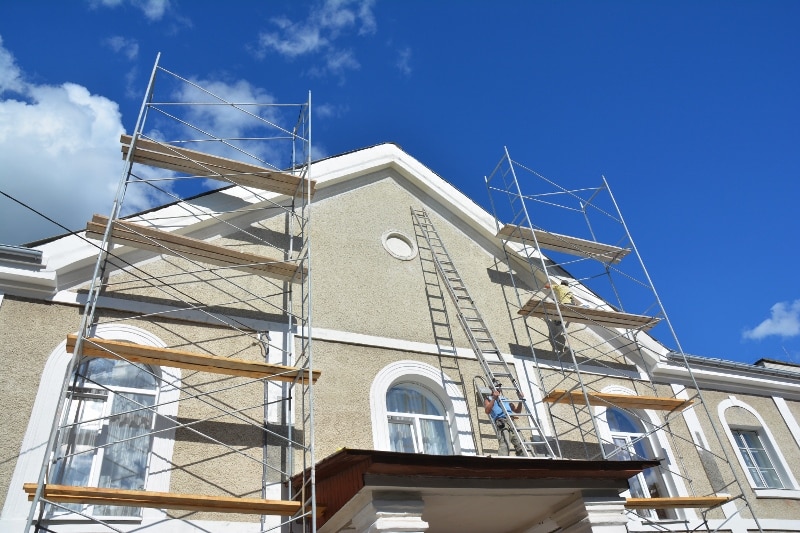
PROS:
Stucco is typically made of cement, sand, lime, water and an epoxy or resin to hold it together. Stucco siding can give your home’s exterior a classy, timeless and natural look. It is very strong, durable and can boost your home’s thermal performance. You don’t need to paint stucco to keep it looking great, but if you decide to change the look of your home in the future, you certainly can paint it to do so. Compared to other siding options, stucco is cost-effective too.
CONS:
If you are planning to DIY your siding installation, do not choose stucco. Stucco installation requires skill, experience and special tools to make it look right. While the product itself is not that expensive, installation is time consuming and you’ll be paying for those man-hours. Still, compared to other cladding options, it’s still cheaper.
COST:
There is a price range for stucco cladding, depending largely on the size and complexity of installation. The cost per square foot for stucco is $6.00 to $9.00. The estimated total cost of installing stucco siding is $1,700 to $5,960.
Tips for choosing the right siding for your home
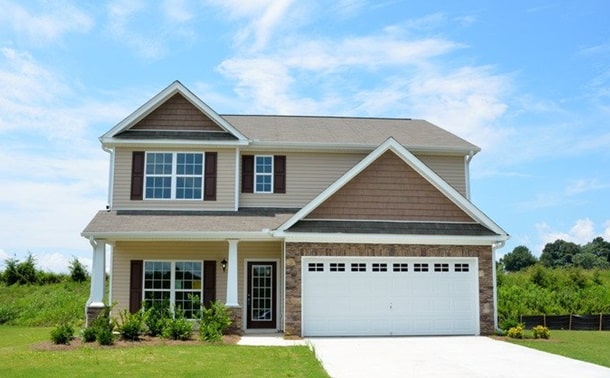
When choosing siding for your home, you have several things to consider. While how the siding looks is important, it should not be your only deciding factor.
Will it stand up to the weather?
The most important thing to consider is how that type of siding will protect your home and if it will stand up to your local climate. The stronger, most water-resistant siding you install, the longer it will last and the more your home will be protected. You should also consider how the temperature changes from season to season, and if your siding material can handle these changes.
Is energy efficiency important to you?
All siding products should have an R-value rating listed. The higher the R-value, the better. Truth be told, no siding is going to have perfect thermal performance without the backing of the materials behind it. For example, 2×6 construction will give your siding a better thermal rating compared to 2×4 construction.
There are insulated siding products on the market. Vinyl, steel and aluminum siding all have a foam insulation backing that will greatly increase its R-value.
Do you like how it looks?
If you’re attracted to all the benefits of one type of siding but can’t stand how it looks, perhaps you should make another choice. You don’t want to spend thousands of dollars on something you don’t like that you must look at every day. Ask your siding contractor if you can see all the colour, style and design options for the siding of your choice. Perhaps there is an option out there you will love visually.
DIY installation or hire a siding contractor?
If you are set on installing the siding yourself, you should choose a siding that is easier to install. Make sure you won’t need to spend a fortune on speciality tools. You should also check what the siding is made of, as harmful dust can pose a health hazard if you must cut it. Also, some types of siding will be more difficult to install due to specific aspects of your home’s exterior. This is something you might not know how to prepare for until you’re halfway through and faced with the challenge. If in doubt, hire a professional siding contractor to take care of the job for you.
Find a RenovationFind Certified siding company in your city!

